AI-assisted planning. Built to maximise profits in Retail and Hospitality.
SameSystem’s AI-driven planning solutions for Retail and Hospitality enhance customer experiences and profitability in Europe’s top chains. Aligning staff schedules with customer presence boosts sales and cuts salary costs.
Compliance insights ensure that planning adheres to both internal policies and external regulations.
Intuitive tools streamline the decision-making process for planners in their daily operations.
Today's consumers prefer physical experiences
For a new generation of consumers, work, study, and even most social interactions – take place digitally.
These consumers are looking for good customer experiences in the physical world and prefer physical retail and hospitality, even at a higher price point.
The dilemma
Consumers seek enhanced experiences, expecting prompt service and advice without delay. Meanwhile, Retail and Hospitality must continuously cut costs to stay competitive. Overstaffing is too costly, and understaffing ruins the customer experience and hurts sales.
The solution
Industry-specific Assisted AI empowers planners and managers to make profit-maximising decisions. Accurate customer traffic predictions enable cost reductions and sales optimisation, avoiding both overstaffing and understaffing.
How often does AI get forecasting right compared to planning managers?
AI outperforms planning managers in forecasting accuracy 86% of the time, based on data from over 100,000 days across international chains. Managers excel in the remaining 14% due to unique insights, for instance, new products, first-time events, or new customer traffic development in the area.

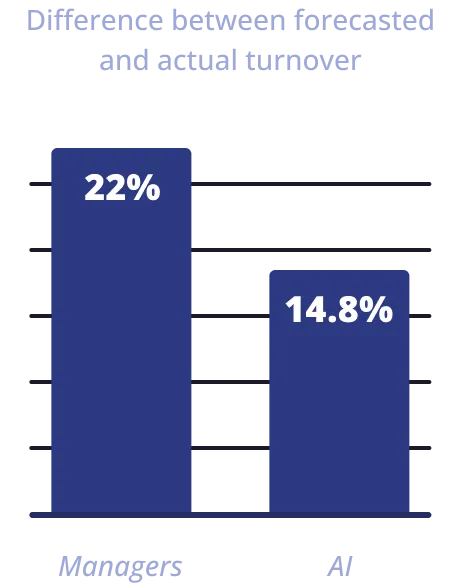
How accurate can we get?
A skilled and experienced manager forecasts with as little as an average 22% difference between forecasted and actual turnover; our AI alone reduces the difference to 14.8%.
Assisted AI
However, by combining AI with manager insights and knowledge, we further reduce the difference to 10.2%. Assisted AI is twice as effective as managers on their own.
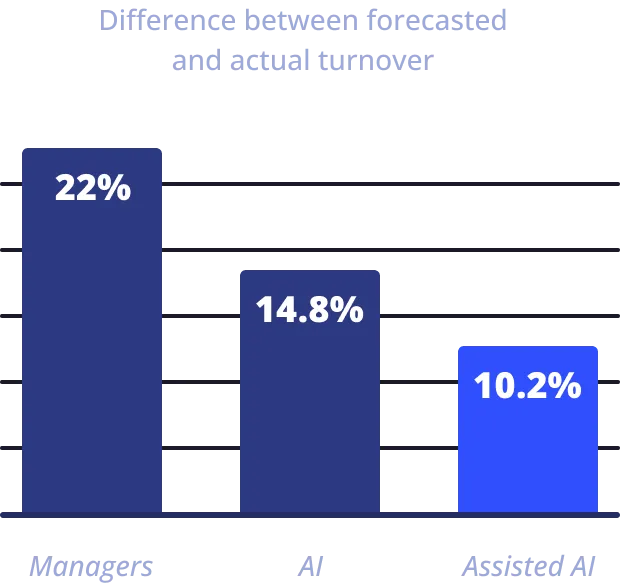
AI eliminates bad habits
Assisted AI significantly aids in eliminating planners’ bad habits by introducing data-driven decision-making. It analyses vast amounts of data, recognising patterns and trends that human planners might overlook. For instance, AI can predict customer traffic more accurately, reducing overstaffing or understaffing, which are common issues from manual forecasting. It helps optimise staff scheduling and ensure efficient use of resources while considering variables like peak hours and seasonal trends. AI minimises reliance on guesswork and habitual decisions by providing real-time insights and recommendations, leading to more profitable operations.
Forecast changes with short notice
AI plays a crucial role in adapting scheduling with short notice by integrating dynamic factors such as weather forecasts, new marketing campaigns, and sales performance trends. Its ability to process and analyse vast datasets swiftly allows for real-time adjustments in staff scheduling. For instance, AI can predict increased customer traffic due to favourable weather or an upcoming sale, prompting a need for more staff. Similarly, it can foresee slower periods influenced by adverse weather or off-peak sales trends, suggesting reduced scheduled hours to optimise staffing costs. This responsiveness enhances operational efficiency and maintains customer service levels, directly impacting performance and customer satisfaction.
Holiday approval by the needs of the business
AI significantly aids managers in evaluating holiday requests by providing insights into forecasted staffing needs for upcoming periods. When a holiday request is submitted, the AI system assesses its impact on the optimal staffing plan. It alerts managers if approving a request could jeopardise the perfect balance of staff needed, considering factors like peak shopping times, seasonal fluctuations, and special events. This enables managers to make informed decisions about holiday approvals, ensuring that customer service and operational efficiency are not compromised while also considering employee satisfaction and well-being.
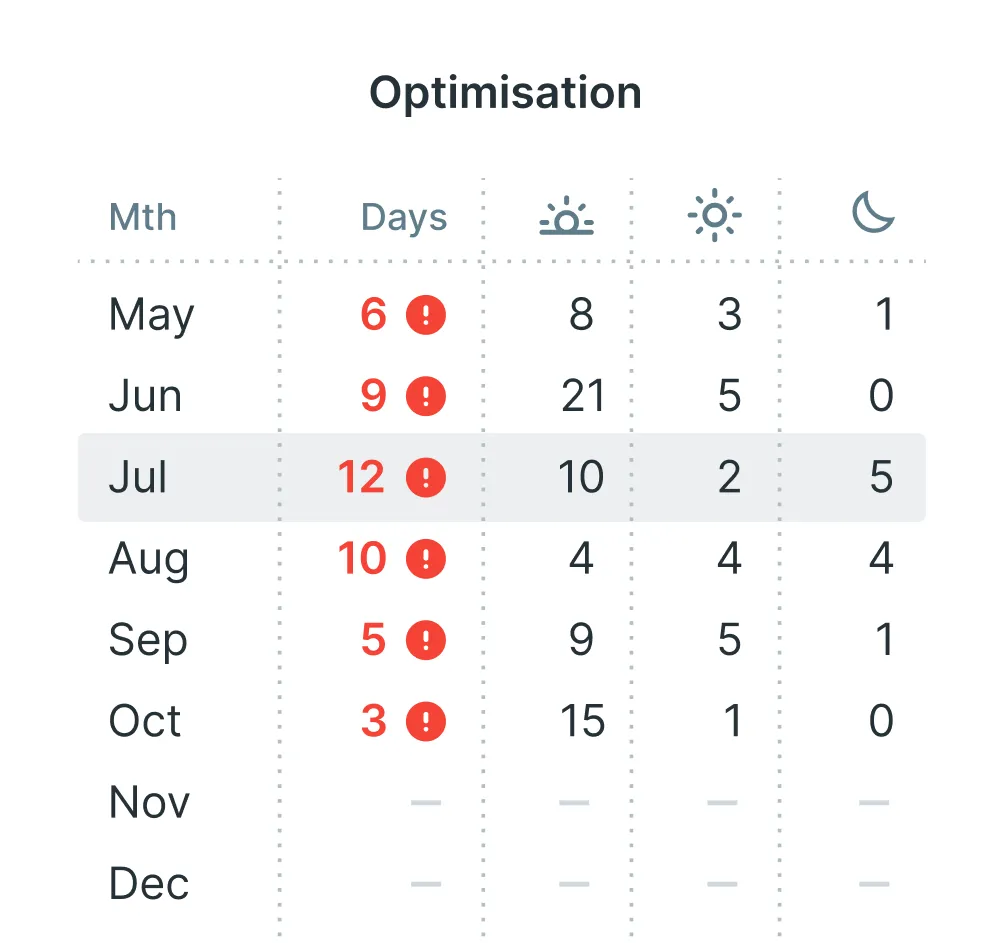
AI eliminates bad habits
Assisted AI significantly aids in eliminating planners’ bad habits by introducing data-driven decision-making. It analyses vast amounts of data, recognising patterns and trends that human planners might overlook. For instance, AI can predict customer traffic more accurately, reducing overstaffing or understaffing, which are common issues from manual forecasting. It helps optimise staff scheduling and ensure efficient use of resources while considering variables like peak hours and seasonal trends. AI minimises reliance on guesswork and habitual decisions by providing real-time insights and recommendations, leading to more profitable operations.
Forecast changes with short notice
AI plays a crucial role in adapting scheduling with short notice by integrating dynamic factors such as weather forecasts, new marketing campaigns, and sales performance trends. Its ability to process and analyse vast datasets swiftly allows for real-time adjustments in staff scheduling. For instance, AI can predict increased customer traffic due to favourable weather or an upcoming sale, prompting a need for more staff. Similarly, it can foresee slower periods influenced by adverse weather or off-peak sales trends, suggesting reduced scheduled hours to optimise staffing costs. This responsiveness enhances operational efficiency and maintains customer service levels, directly impacting performance and customer satisfaction.
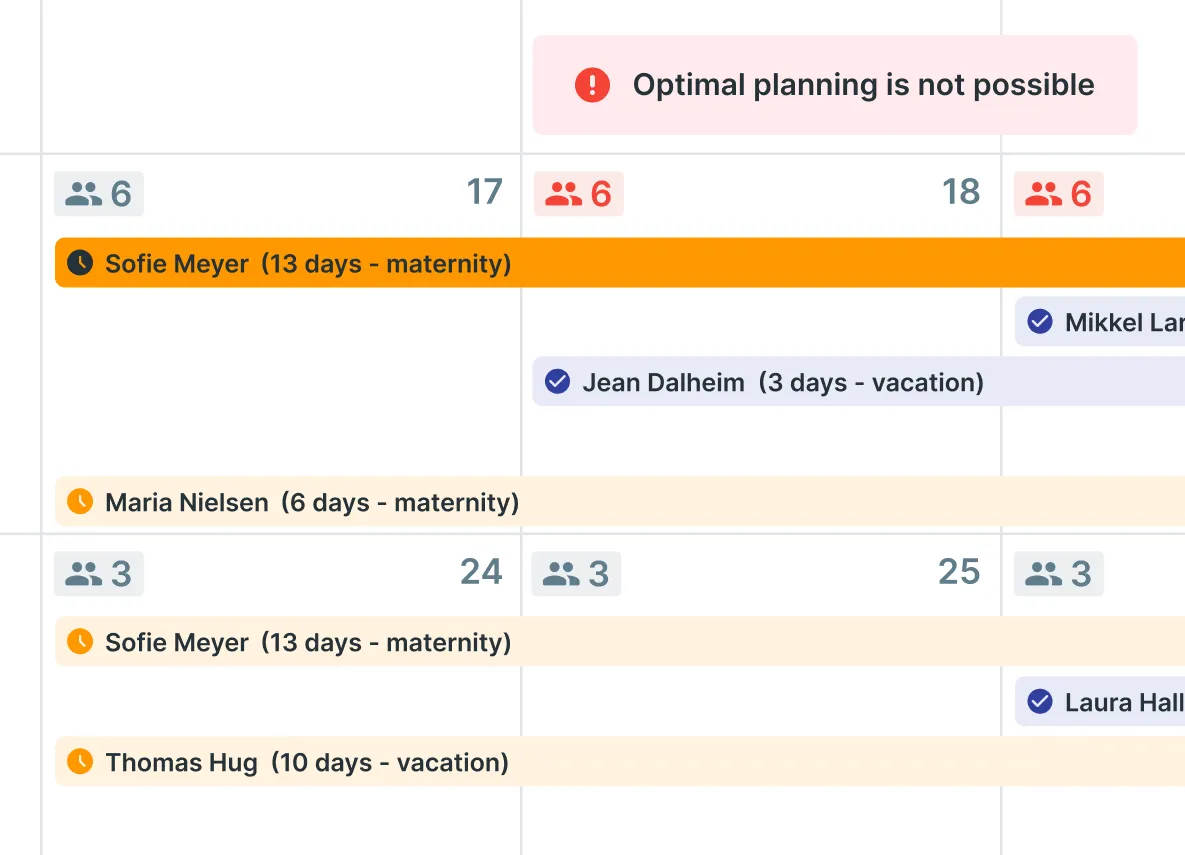
Holiday approval by the needs of the business
AI significantly aids managers in evaluating holiday requests by providing insights into forecasted staffing needs for upcoming periods. When a holiday request is submitted, the AI system assesses its impact on the optimal staffing plan. It alerts managers if approving a request could jeopardise the perfect balance of staff needed, considering factors like peak shopping times, seasonal fluctuations, and special events. This enables managers to make informed decisions about holiday approvals, ensuring that customer service and operational efficiency are not compromised while also considering employee satisfaction and well-being.
An outcome-based approach to planning
AI’s analytics and predictive features promote data-driven decisions, and managers using AI for forecasting shift from intuition towards outcome-based planning that aligns with business objectives. The vast array of data AI analyses helps set targets, optimise resources, and identify growth opportunities. By integrating AI into the planning process, managers swiftly adapt to market changes, adapt strategies, and drive their departments towards more effective, results-focused operations.
We can see an increased business understanding through resource optimisation as a clear effect of using SameSystem. Store managers have received a powerful tool to manage resources. This has contributed to us improving our salary percentage in the chain for several years.
Thomas Just Rasmussen, COO, Intersport
Compliance ensures that planning adheres to both internal policies and external regulations
SameSystem ensures scheduling adheres to internal policies, external legal and union requirements, and specific terms in the individual employee’s employment contract. If potential violations are detected, SameSystem shows how the scheduling does not align with the requirements. This assists managers in preventing potential conflicts and legal issues. With SameSystem, managers can confidently execute their scheduling duties, knowing they comply with all necessary regulations, agreements and internal policies in the company.
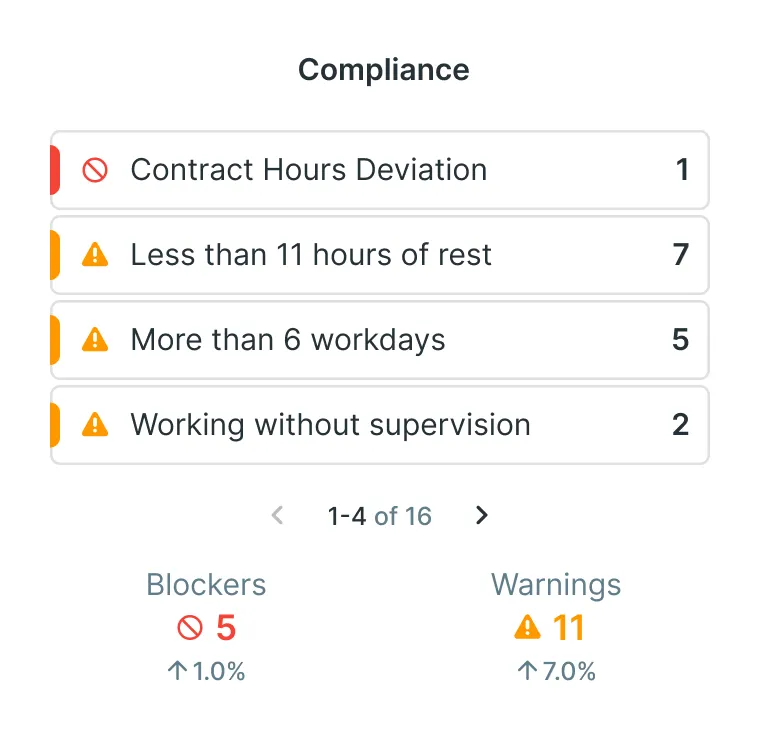
Daily Tools for easy operations
With easy-to-use tools assisting managers in daily operations, SameSystem leads to fewer administrative burdens, misunderstandings and mistakes, allowing the manager to focus on the business.
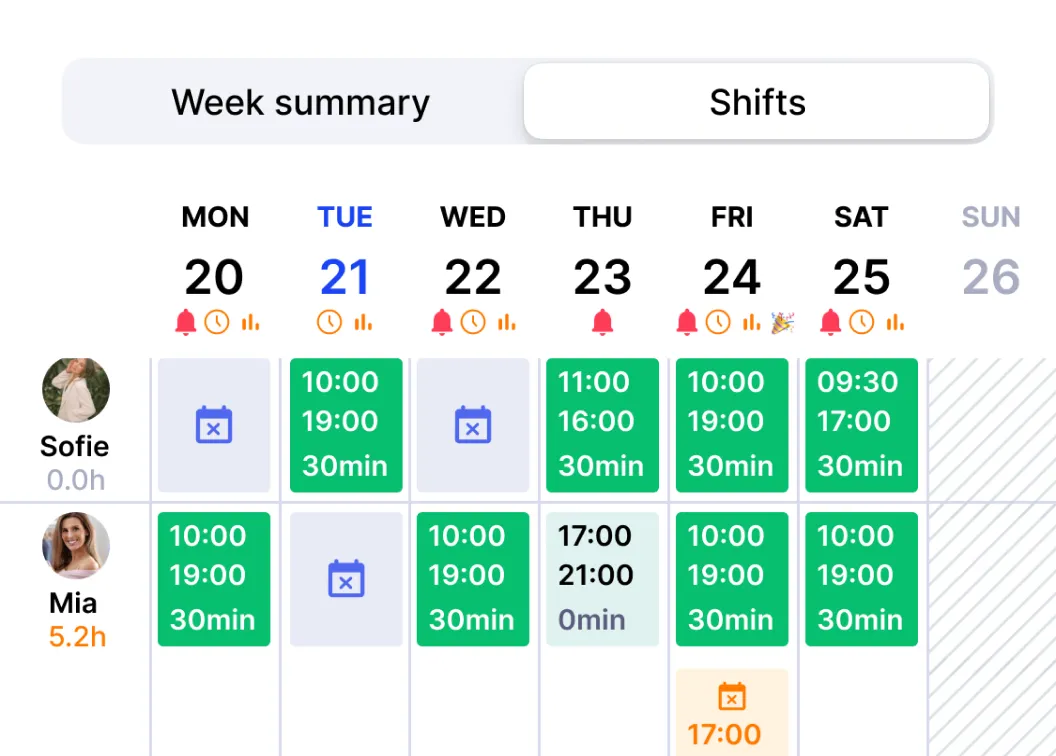
Easy planning
Store managers can schedule easily using assisted AI from the desktop or the mobile app. Employees see the current schedule in the mobile app, preventing misunderstandings about working hours. When the schedule is modified, affected employees are asked to confirm that they have seen the changes.
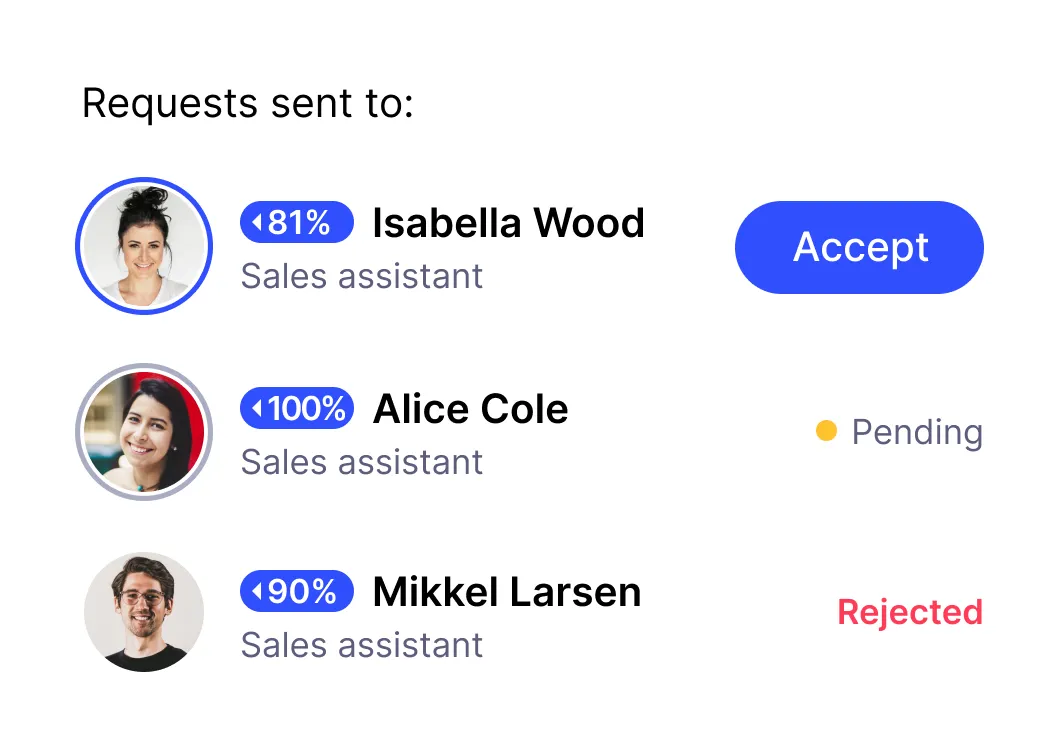
Auto-filling open shifts
SameSystem automatically offers unfilled shifts to employees with a link. After employees respond, the manager chooses the preferred candidate. The schedule updates automatically and employees are notified.
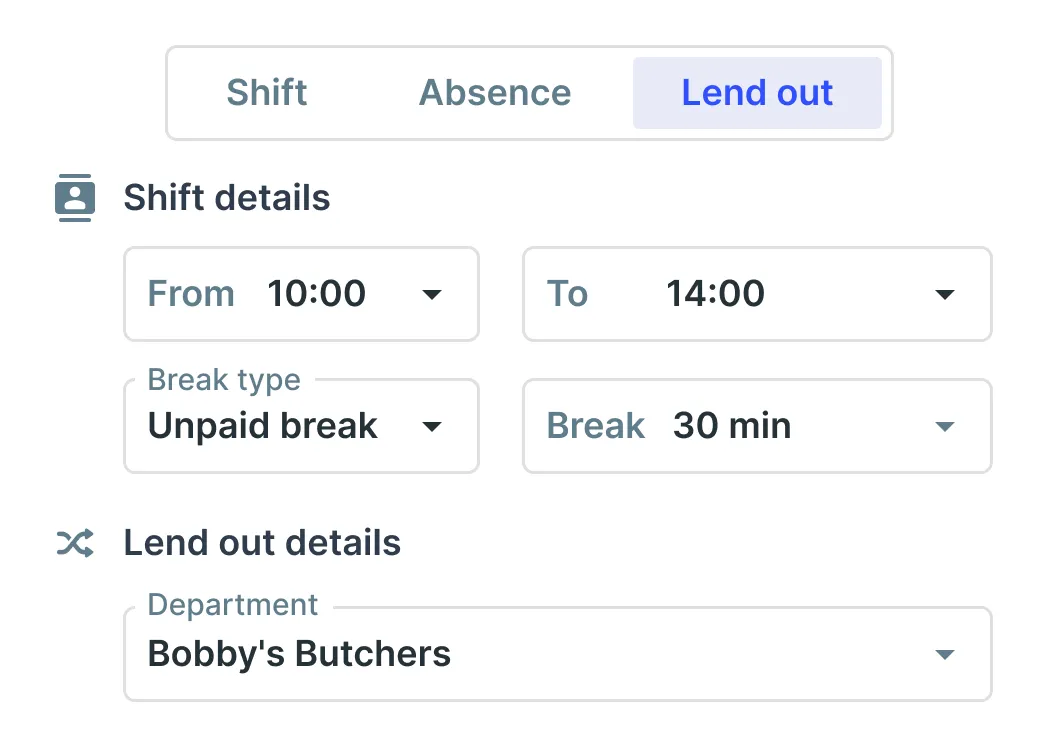
Simple lend-outs
Lending staff to another store is simple, with schedules and salary costs automatically updated for the correct store.
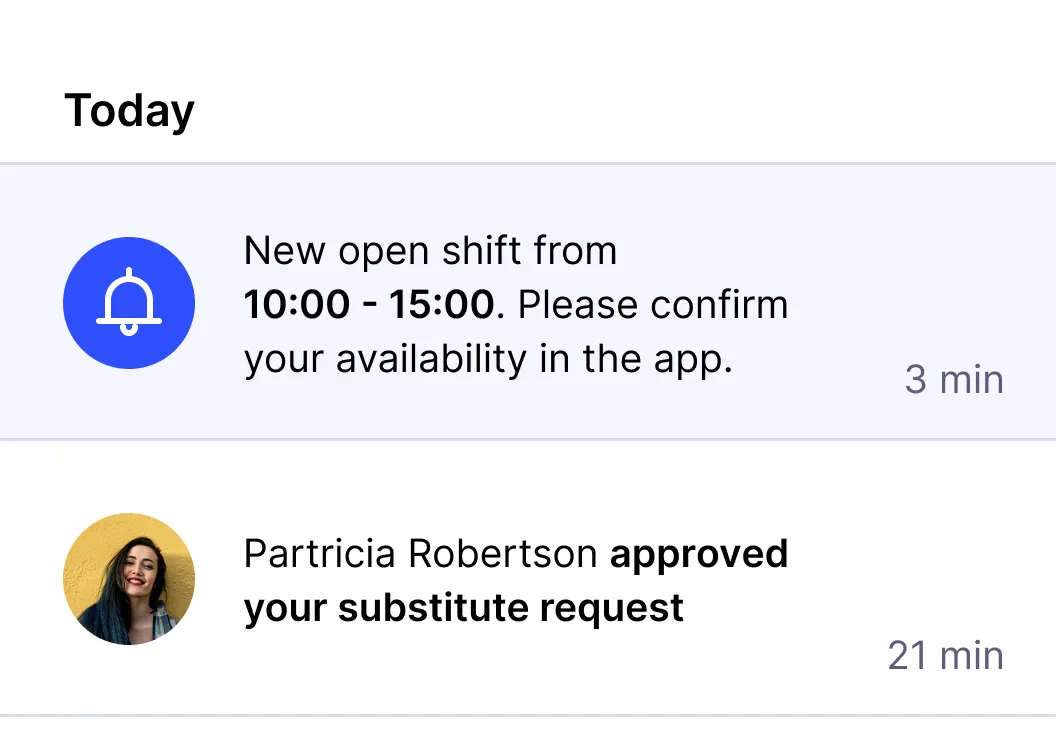
Quick replacement of ill employees
When an employee is ill, SameSystem immediately alerts all off-duty employees with a link to confirm availability. The store manager chooses a replacement, everyone is informed, and the schedule updates automatically.
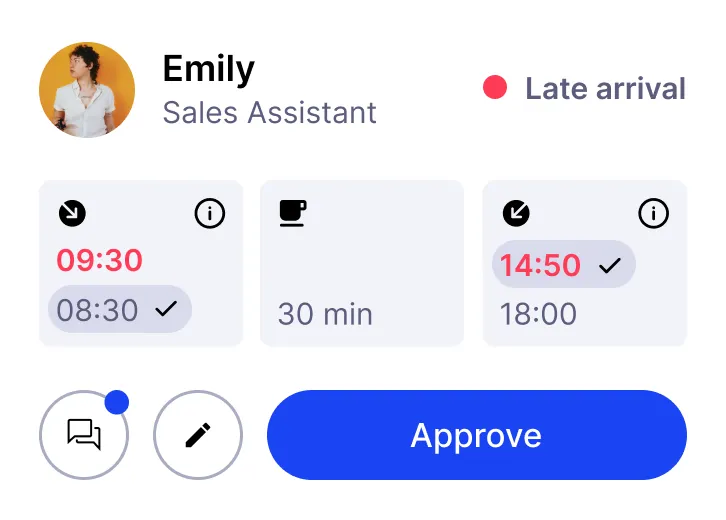
Tracking of late arrivals
If an employee is late, the time is automatically registered, the schedule clearly shows it, and precise documentation is provided.
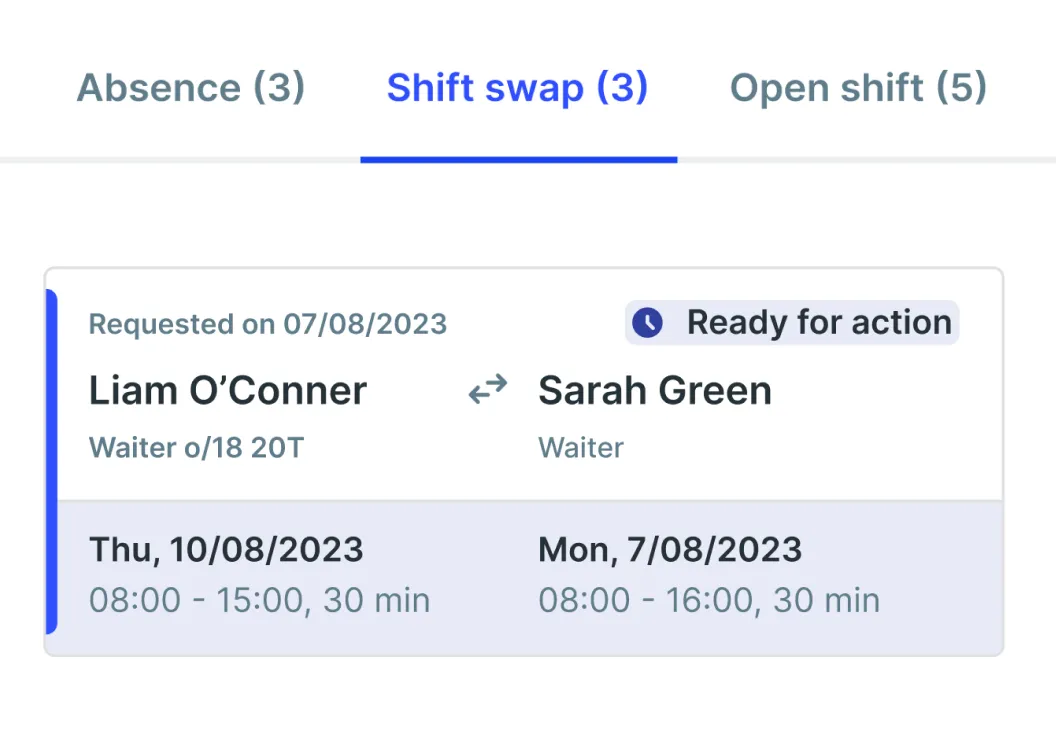
Swapping shifts
Employees can easily request shift swaps through the app. Once approved by the manager, the schedule updates automatically.
Live insights into important metrics
A live overview of Key Performance Indicators (KPIs) aligns the objectives and strategies of department and district managers. A clear and quantifiable overview of KPIs such as sales and wage costs, wage percentage alerts for planning issues and rule violations highlights areas needing improvement, for instance, suboptimal planning and ensures that wage budgets are maintained. That creates a common understanding of the future potential and enables informed decisions about daily operations and staffing.
District managers gain a broader perspective across multiple stores, identifying patterns, sharing best practices, and setting realistic and strategic goals for each store, as well as a focus on key areas that drive business growth and customer satisfaction. The live insights and mutual understanding pave the way for the success of the business.
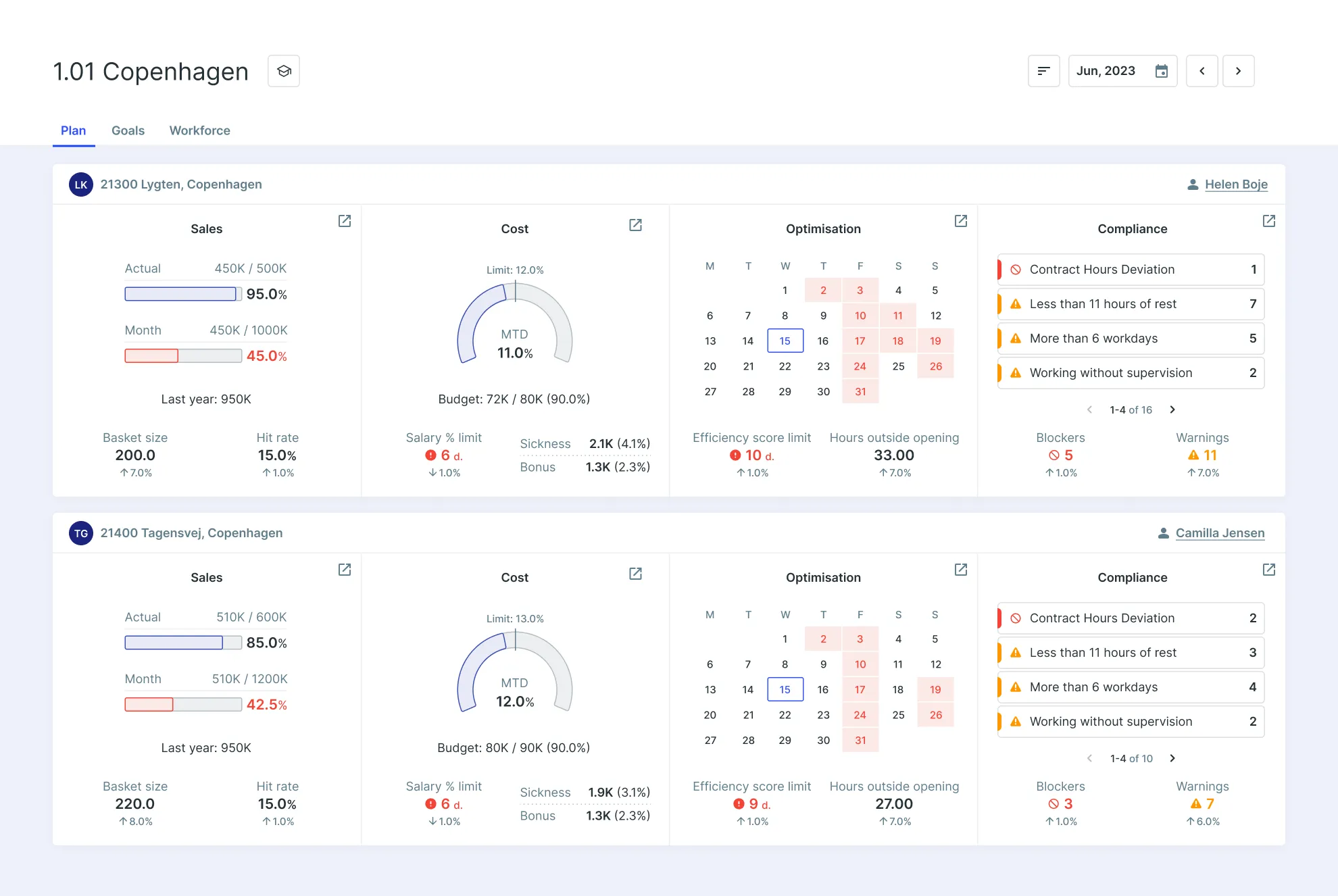
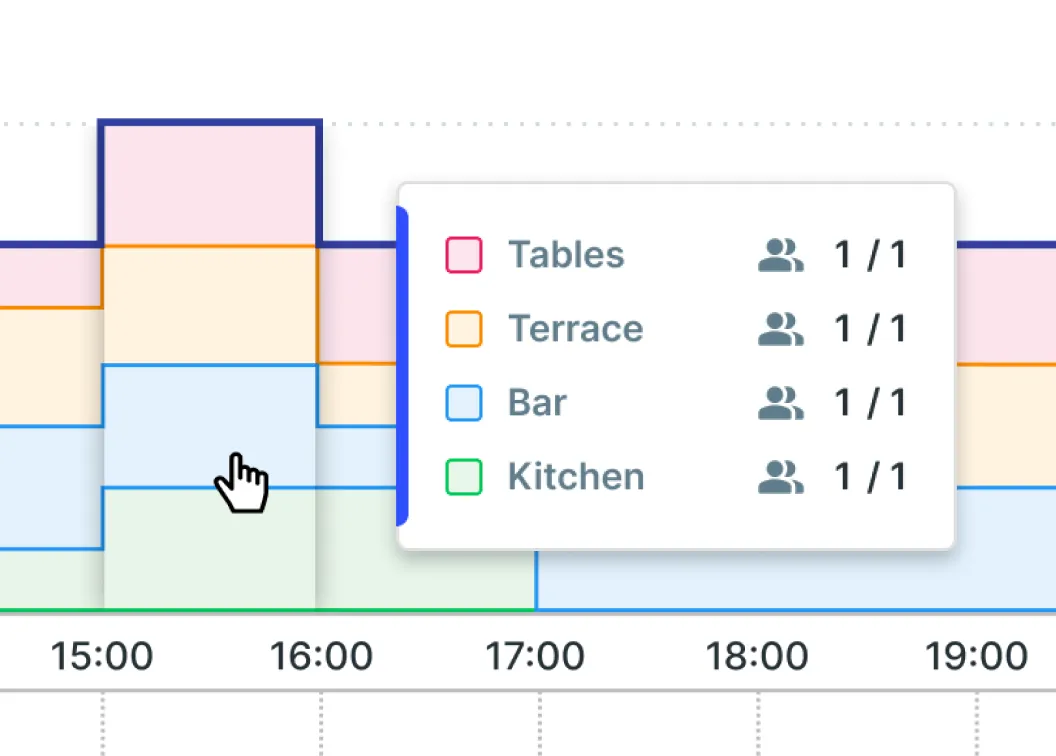
Divide shifts into zones, where employees can see in what zone they are working.
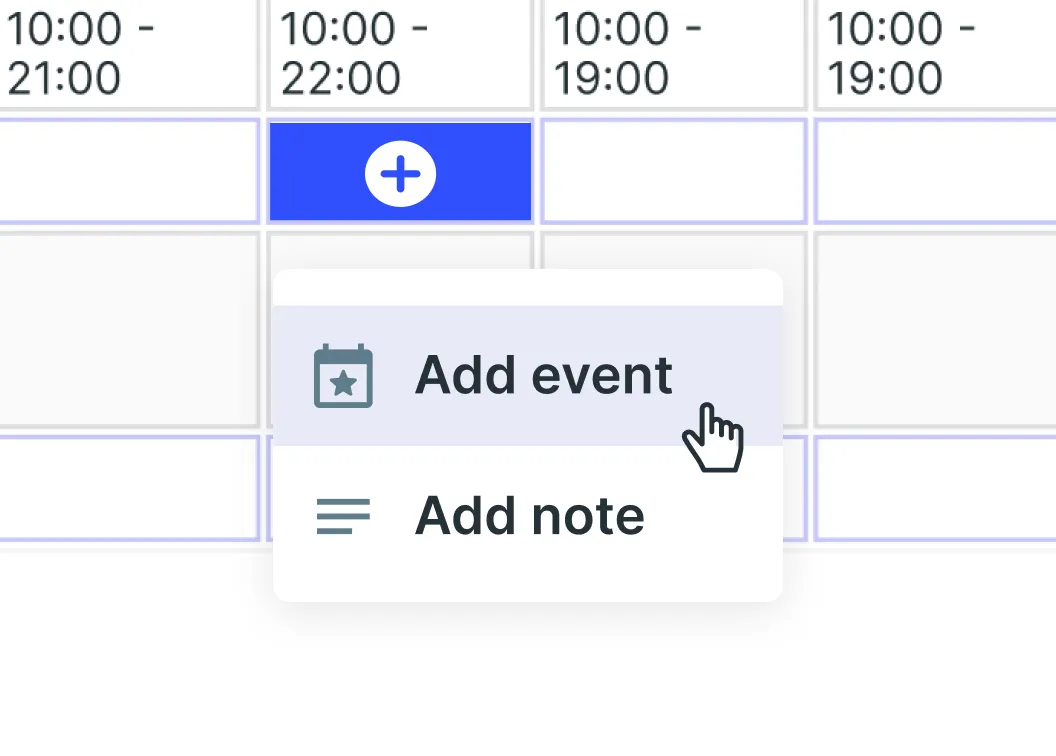
Events are displayed in the schedule daily and when planning and are used for forecasting sales and traffic.
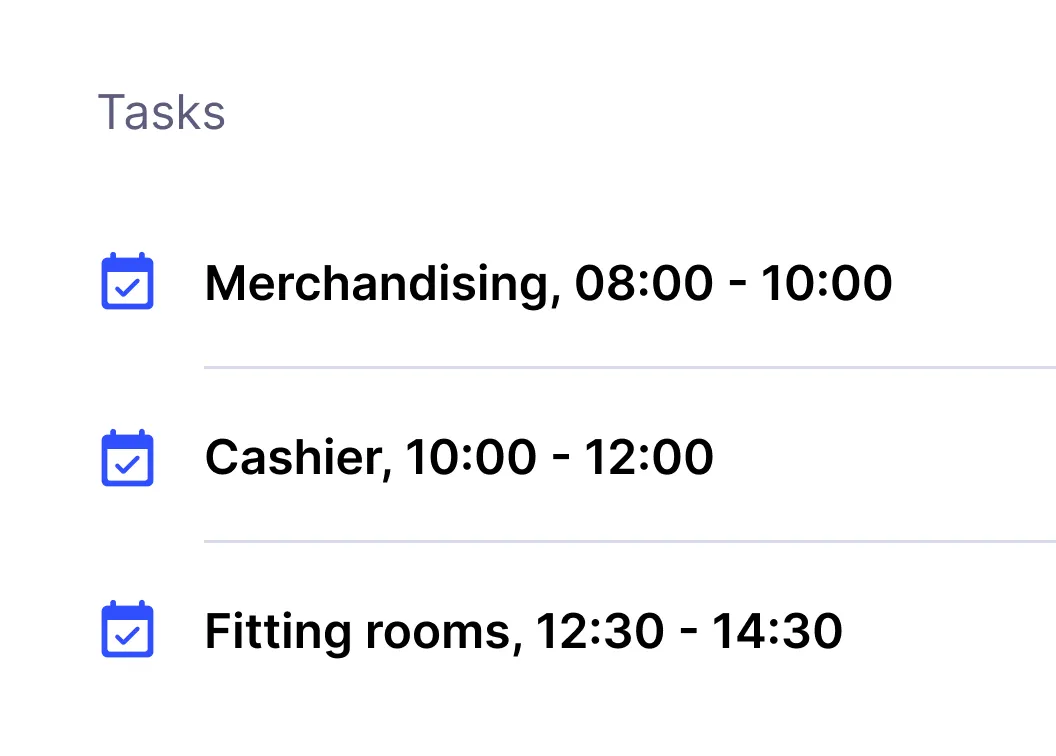
View, add, and edit tasks for each employee, including integrations to employee engagement platforms.